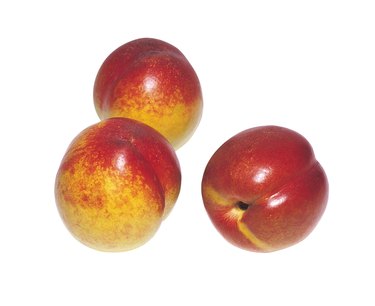
Nectarine (Prunus persica nectarina) is a sub-species of peach (Prunus persica), so the fruit looks similar, except nectarines are usually smaller, smoother, redder and more aromatic. Fruit from nectarine may be yellow or white-fleshed. Some newer varieties may have a redder skin ground color and firmer texture than older varieties, but taste can always indicate their ripeness. Picking nectarines before they are fully ripe but not immature is ideal, because fully ripe fruit may attract pests. For best results, nectarine needs to grow in U.S. Department of Agriculture plant hardiness zones 6 to 8.
Step 1
Examine the color of the fruit, including the shaded areas where green may be concealed. When the green skin ground color changes to yellow or a cream color in white flesh nectarines, it is color breaking, indicating it is ripe for picking. Avoid selecting fruit that is an immature green color, which often results in poor quality, and avoid waiting until the fruit is a reddish color because it may attract pests.
Video of the Day
Step 2
Press gently on the suture line, the area from stem to blossom end on the fruit. Ideally, the fruit will feel firm, but the suture line will feel soft. Fruit that is green and small, and feels firm along the suture line needs more time to mature.
Step 3
Pluck a fruit off the stem by pulling it toward you and twisting it. Taste it to tell if it is ripe. Sweetness indicates that it is ripe, even if the texture is crunchy. Fruit that tastes bitter is not ripe for picking.
Tip
Nectarines can be fully ripened in a brown paper bag or fruit ripening bowl, and stored in a refrigerator for up to two weeks.
Video of the Day